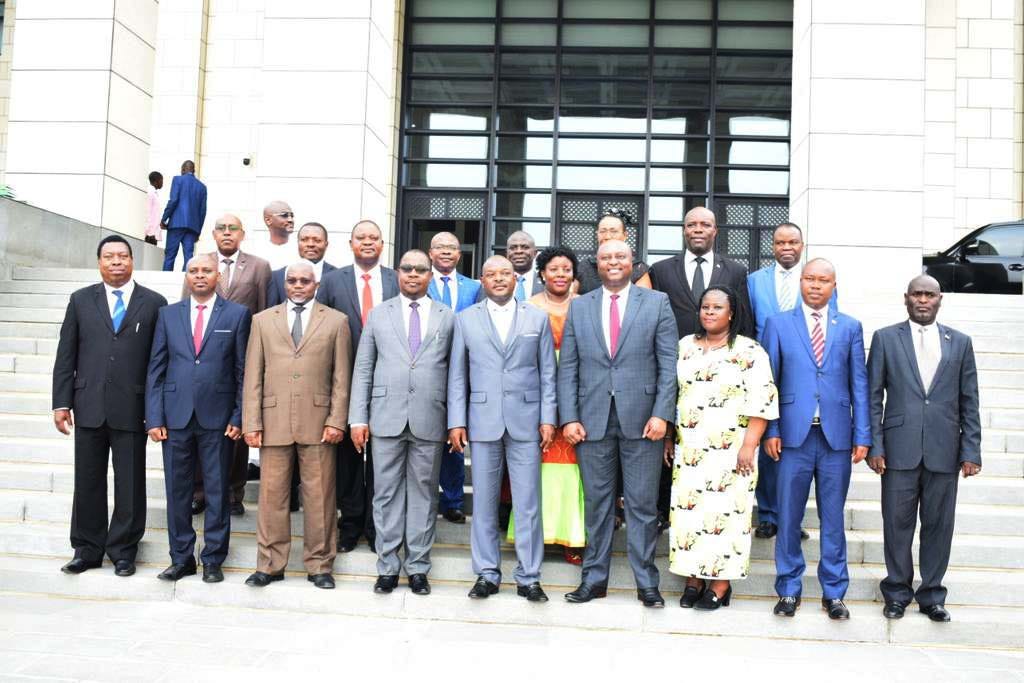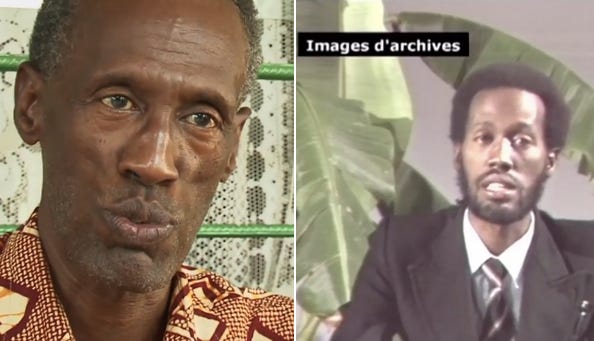Contours of a New Diplomatic Wave in Burundi

Dear readers,
This Thursday, February 6, the Permanent Secretary at the Ministry of Foreign Affairs of Burundi Mr. Isidore Ntirampeba received new Ambassadors to Burundi who came to present their figurative copies of their Credentials:
The Ambassador of the Czech Republic, Mr. Martin Klepetko
The Ambassador of Japan, Mr. Masahiro Imai
The Ambassador of the Italian Republic, Mr. Massimiliano Mazzanti.
The Ambassador of Burkina Faso, Ms. Ganou Do any Kassamba Madina.
The Ambassador of the Republic of Finland, Mrs. Riita Swan
The Ambassador of Pakistan, Mrs. SaqlainSyedah
The Ambassador of Ethiopia, Mrs. Alemtsehay Meseret Gelaw
The Ambassador of the Republic of Botswana, Mr. Gobopang Duke Lefhoko
The Ambassador of the Republic of the Philippines, Mr. Alex G. CHUA
The Ambassador of the Republic of Malawi, Mr. Glad Chembe Munthali
The Ambassador of the Republic of Georgia, Mr. Zulab Dvalishvili.
The Ambassador of the Kingdom of Denmark, Mr. Nicolas Hejberg Peterson
Twelve new diplomats . Even though it might be interesting to go through and examine the relations that Burundi has with each country that sent a new diplomat, in today’s Newsletter let us look closer at recent events that may shape the Burundi new diplomatic efforts.
2020 in Burundi diplomacy
January was a very busy month for Burundi diplomacy. President Pierre Nkurunziza met Ambassadors representing Burundi in different countries and International Organizations. They held discussions on the socio-political and economic situation prevailing in Burundi and the cooperation between Burundi and other countries. He invited Ambassadors to focus on bilateral cooperation rather than aid. “Friendly cooperation remains the cornerstone of any bilateral cooperation,” he said.
By the end of 2019 and early January 2020, the Minister of Foreign Affairs traveled to countries like Uganda, Qatar, Gabon, Kenya, Tanzania, and Russia. He intensified contacts with the Heads of Diplomatic and Consular Missions and the Representatives of International Organizations accredited to Burundi, emphasizing that this new decade brings change. He indeed asked the Diplomatic Corps to kindly inform their accreditation capitals to turn the page of 2015.
So what happened in 2015 in diplomacy?
The 2015 crisis
In 2015, in order to put pressure on Gitega, European Union countries cut their aid. Countries like the Netherlands that had originally promised to provide the CENI(Burundi Independent Electoral Commission) with manpower and funds retracted, Holland suspended its support for the Security Sector Development Program, especially the army and the police.
Gitega withdrew accreditation to the Belgian ambassador. The government justified the decision by “degrading confidence.” Gitega accused Brussels of interfering in its affairs.
Analysts and commentators could not help but conclude that Burundi was being isolated day after day on the international diplomatic scene.
In an interview with a local media, Amb. Albert Nshingiro(Permanent Representative of the Republic of Burundi to the UN in New York) presenting key diplomatic achievements in 2016, emphasized: “Burundi is not isolated as some would like to believe: 180 out of 193 UN member countries have understood our situation".
He added that one of the greatest achievements was the intense lobby to explain to partners the real political and security situation prevailing in Burundi. He noted that except for a very small minority of partners with hidden agendas, more than 180 UN member countries have already understood the situation and agreed to treat Burundi on merit.
That was hard to believe, and the question remained, how can he say that Burundi is not isolated with all sanctions and resolutions against Burundi?
A lot has happened since then, 2020 election context will reveal what is next
Diplomatic efforts vs Opposition’s lobbying
Burundi 2020 Elections are at the center of current interests for almost all diplomatic missions in Burundi. On January 31 the Heads of Mission of the EU member states in Burundi issued this statement:
“At the start of this year, when several parties have already nominated their candidates for the presidential election of May 20, 2020, the European Union welcomes the gradual establishment of the electoral process. The European Union wishes it to be credible, inclusive and peaceful in transparency and respect for freedom of association and of the press.”
A statement that made angry the opposition, especially MSD (Mouvement pour la Solidarité et la Démocratie ) that called for more severity from Europeans on Burundi situation.
In its declaration on Wednesday, the Solidarity and Democracy Movement said that it is not satisfied with the European Union statements. The MSD urges the European Union to constrain the power of the Cndd-Fdd. and wants declaration to be a delicate and diplomatic reminder denouncing that the elections being prepared by the government in power do not meet the required conditions.
As they approach, we reiterate our longstanding expectation that Burundi’s 2020 elections be transparent, inclusive, and free from violence. We encourage all parties to foster the open discussion necessary for the Burundian people to make informed choices for their future.— U.S Embassy in Burundi, January 23,2020
Meanwhlie Diplomats are intensifying contacts with Gitega, the United Nations Assistant Secretary-General for Africa, Ms. Bintou Keita, has expressed the United Nation’s desire for peaceful, credible and democratic elections in Burundi.
Ms. Keita made the statement Tuesday during a meeting with the EAC Secretary General, Amb. Liberat Mfumukeko, in Bujumbura, Burundi, adding that peaceful elections in Burundi were a prerequisite for political stability in the nation and the region as a whole.
The UN delegation led by Amb Jurg Lauber , Chairman of Burundi configuration of theUN Peacebuilding got updates this tuesday on preparations of forthcoming elections from President and members of Independent National Election Commission.
The attention given to the electoral process and the international community softening its statements on Burundi may lead obervers of Burundi situation to believe that there is a new diplomatic wave.
For many analysts, it is hard now— for the radical Opposition that lost its main platform known as CNARED ( Conseil National pour la Restauration de l'Accord d'Arusha pour la Paix et la Réconciliation au Burundi ) due to internal conflicts— to be taken seriously or to weight on how Burundi diplomatic relations may evolve especially after the 2020 elections.
Few commentators believe that hardliners from exiled civil society count on their large network in human rights for a new wave of lobbying that is nurtured by “ongoing clashes between the ruling party youth and opposition party members like CNL (Congres National Pour la Liberte).”
While new Human Reports are being published on Burundi, analysts believe that there is a diplomatic battle still going on— but on the other hand, some reports denounce the violent approach that the radical opposition is using— as it appears in this latest report by the NGO Crisis Group that confirms the MSD to have an armed wing called RED Tabara (Résistance pour un État de Droit au Burundi), made up mainly of young people who were involved in the demonstrations against the third term of Pierre Nkurunziza.
This situation makes it hard to predict what will be the outcomes of a diplomatic battle that the opposition may like to fuel continually when the Burundi government and its diplomats emphasize that the 2015 crisis page should be turned.
“A diplomat who says “yes” means “maybe", a diplomat who says “maybe" means “no”, and a diplomat who says “no” is no diplomat.”
― Talleyrand ,Former Minister of Foreign Affairs of the Kingdom of France (1754-1838)
Wait and See..
Fabrice Iranzi
Founding Editor, RegionWeek.com
IN THE HEADLINES

Athanase Ntiyanogeye, the first news anchor of Burundi National Television (RTNB) starting December 1984, dies, he was an editor and producer of political programs, from 1979 to 2015. He was also a professor of journalism and communication at universities in Burundi and Rwanda, consultant in journalism and member of the trainers pool at the Maison de la Presse in Bujumbura.
The Burundi Revenue Authority launched the 2019 tax collection campaign this Tuesday. In a meeting with the administrators of Bujumbura Mairie it was announced that the expected revenue is over BIF 6 billion, 60% of which will go to the municipalities, 40% to the public treasury.
TRUTH AND RECONCILIATION COMMISION UPDATES

The Truth and Reconciliation Commission (CVR) continues work to excavate the mass graves of the 1972 massacres at Ruvubu (Shombo-Karusi-Burundi). After ten days of work, the number of victims excavated from the six mass graves is 6,032. The largest mass grave discovered to date contained 1,319 victims . Phase One of CVR work on the Ruvubu site will end this Saturday, February 8, 2020
We understand that it is exceptionally difficult for business leaders and highly productive Professionals to stay current on all important news. We filter the news, to bring to you concise information about game-changing events and insights.
We compiled all the key briefings of January in One document (PDF), updated with all the developments that occurred after we published the daily briefing, we sell it at $5, if you want to receive of RegionWeek January Briefings a copy click here, we will send it to you.
----
RegionWeek is a Burundi-based media for a new generation of achievers in Africa, a platform devoted to chronicling the journey to Freedom and Empowerment.



